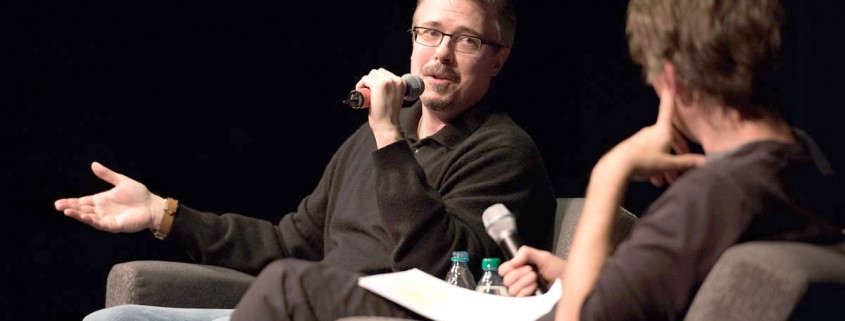Breaking Bad’s Vince Gilligan speaks at USC
Vince Gilligan, creator, writer and executive producer of the Emmy award-winning TV series Breaking Bad and its spinoff Better Call Saul, spoke Tuesday night in the Bing Theatre about the changing landscape of the television industry, the importance of organic writing and the inspiration behind his most popular shows.
The event, hosted by the Undergraduate Student Government Program Board, USC Special Events Committee and USC Speakers Committee and moderated by Interim Dean of the School of Dramatic Arts David Bridel, featured a question-and-answer period with Gilligan, followed by a meet and greet.
Gilligan, who started out writing for The X-Files before pioneering his own show with Breaking Bad, described the process that got him into the television industry as somewhat fortuitous. A graduate of New York University’s Tisch School of the Arts, Gilligan spent the first five years after graduating from college writing film scripts, a career he had dreamed of since the third grade. However, after a chance meeting with Chris Carter, the screenwriter for The X-Files at that time, he embraced television as a new medium for creative expression.
“It was very cinematic filmmaking [on The X-Files], and I’d been a movie fan all my life, but I really started learning about cinema on that show,” Gilligan said. “That means telling stories through pictures instead of talk; some of the best moments on The X-Files and some of the best moments on Breaking Bad are the moments between characters, the looks that pass between people, the nonverbal storytelling.”
A native of Richmond, Virginia, Gilligan was initially hesitant to make the move to Los Angeles in order to begin his work in the television industry; however, after settling in, he spent seven years writing for The X-Files before breaking off to write on his own. The slump period that followed was the inspiration for what would become Breaking Bad; Gilligan recalled a conversation with a fellow unemployed writer, who joked that the two of them should get rich quick by installing a meth lab in an RV. Although Gilligan knew that he would never realistically turn to cooking meth for his livelihood, he wondered what it would take to convince an average-law abiding citizen to take someone up on that offer, a thought process that eventually created the character of Walter White.
“I was interested in taking a good, straight arrow, boring guy and turning him into a real villain, a real criminal,” Gilligan said. “I wanted to see how bad this guy could get and have people still interested.”
Viewer interest drove Gilligan to keep writing, developing much-loved characters such as Saul Goodman and Jesse Pinkman beyond the original frames he had for their characters. It also led him to defy many commonly-accepted rules for television writing, such as the need to start with quick action or witty dialogue. Instead, Breaking Bad utilizes a slower form of storytelling, one that draws its viewers in visually, a characteristic that Gilligan said is especially important in the rapidly changing world of entertainment.
“In a world where we have everything pulling at us with different forms of media, YouTube, all the channels, the Internet, conventional wisdom says that you have to hook [viewers] fast,” Gilligan said. “I really think what’s held us in good standing on Breaking Bad is going the opposite way because most of the time folks don’t.”
Gilligan’s approach toward screenwriting parallels his belief in a careful exposition; when describing his advice towards burgeoning writers, he emphasized the need to allow characters to develop naturally rather than forcibly. As a result, the story would flow, but only if the writer is willing to flow along with it.
“I was so lucky about how much I didn’t know [going into the show],” Gilligan said. “I didn’t have any clue in those first years that the show would blow up like it did, so I treated it like an experiment. If, as a writer, you get too rigid, you cease to be able to make lemonade out of lemons and you lose out on a lot of good stuff.”

